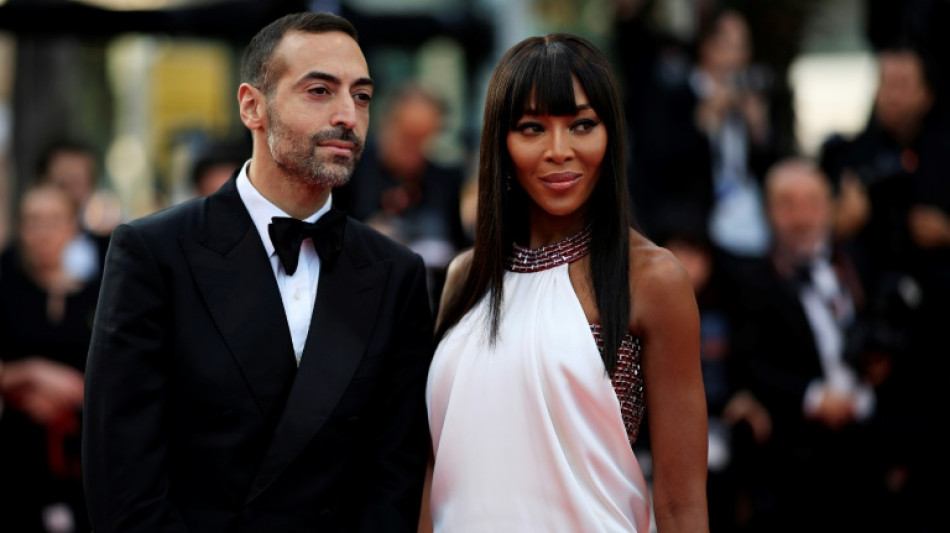
-
 'Rust' to premiere three years after on-set shooting
'Rust' to premiere three years after on-set shooting
-
Strike at French cognac maker Hennessy over measures in China spat

-
 Xi, Lula meet in Brasilia to 'enhance ties'
Xi, Lula meet in Brasilia to 'enhance ties'
-
SpaceX fails to repeat Starship booster catch, as Trump watches on
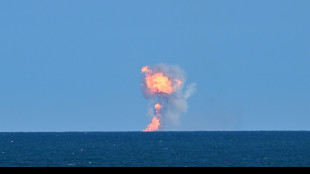
-
 'I have left a legacy': Nadal retires from tennis
'I have left a legacy': Nadal retires from tennis
-
US recognizes Venezuela opposition's Gonzalez Urrutia as 'president-elect'

-
 European powers, US seek to censure Iran at UN nuclear watchdog board
European powers, US seek to censure Iran at UN nuclear watchdog board
-
UNAIDS chief says husband, Ugandan opposition figure Besigye, 'kidnapped'

-
 Nadal's sensational career ends as Netherlands defeat Spain in Davis Cup
Nadal's sensational career ends as Netherlands defeat Spain in Davis Cup
-
US announces talks with Israel over civilian casualties in Gaza

-
 SpaceX fails to repeat Starship booster catch, as Trump looks on
SpaceX fails to repeat Starship booster catch, as Trump looks on
-
G20 summit ends with Ukraine blame game

-
 Trump appoints TV celebrity 'Dr. Oz' to key US health post
Trump appoints TV celebrity 'Dr. Oz' to key US health post
-
European stocks fall on Ukraine-Russia fears, US focused on earnings

-
 Last-gasp Szoboszlai penalty rescues Hungary draw with Germany
Last-gasp Szoboszlai penalty rescues Hungary draw with Germany
-
Germany, Netherlands draw as Nations League group stage ends

-
 Hong Kong tycoon Jimmy Lai takes witness stand in collusion trial
Hong Kong tycoon Jimmy Lai takes witness stand in collusion trial
-
Guardiola set to extend stay as Man City boss - reports

-
 Minnows Botswana hold Egypt to qualify with Mozambique, Tanzania
Minnows Botswana hold Egypt to qualify with Mozambique, Tanzania
-
Inter Miami coach Martino leaving club for 'personal reasons' - club source

-
 Chinese man sentenced to 20 months for Falun Gong harassment in US
Chinese man sentenced to 20 months for Falun Gong harassment in US
-
Hong Kong court jails 45 democracy campaigners, drawing condemnation

-
 'I did it for Rafa': Alcaraz after keeping Spain Davis Cup dream alive
'I did it for Rafa': Alcaraz after keeping Spain Davis Cup dream alive
-
Alcaraz keeps Spain and Nadal Davis Cup dream alive

-
 Trump names China hawk Howard Lutnick commerce secretary
Trump names China hawk Howard Lutnick commerce secretary
-
Europe's pivotal role in bid to strike COP29 climate deal
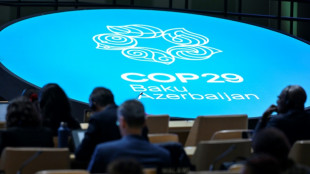
-
 MotoGP champion Martin falls on Aprilia debut
MotoGP champion Martin falls on Aprilia debut
-
Bodies burned after Haiti police, civilians kill 28 alleged gang members

-
 'Probably my last match': Nadal after Davis Cup singles defeat
'Probably my last match': Nadal after Davis Cup singles defeat
-
Iran faces new censure over lack of cooperation at UN nuclear meeting

-
 Afghan woman teacher, jailed Tajik lawyer share top rights prize
Afghan woman teacher, jailed Tajik lawyer share top rights prize
-
Pressure mounts on Scholz over bid for second term

-
 Take two: Biden makes it into G20 leaders' photo
Take two: Biden makes it into G20 leaders' photo
-
Russia vows response after Ukraine fires long-range US missiles

-
 Spain's Nadal loses in Davis Cup quarter-finals singles opener
Spain's Nadal loses in Davis Cup quarter-finals singles opener
-
Four elite Brazil officers arrested over alleged 2022 Lula murder plot

-
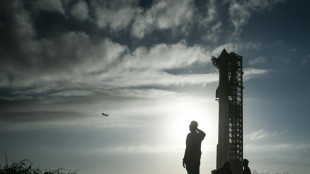 SpaceX set for Starship's next flight -- with Trump watching
SpaceX set for Starship's next flight -- with Trump watching
-
Trump ally seeks to block trans lawmaker from women's restrooms

-
 Slovakia oust Britain to meet Italy in BJK Cup title match
Slovakia oust Britain to meet Italy in BJK Cup title match
-
Top-selling daily French daily Ouest-France stops posting on X

-
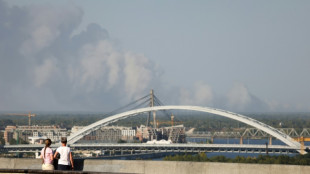 Russian invasion toll on environment $71 billion, Ukraine says
Russian invasion toll on environment $71 billion, Ukraine says
-
'Sabotage' suspected after two Baltic Sea cables cut

-
 'You will die in lies!': daughter clashes with father at French rape trial
'You will die in lies!': daughter clashes with father at French rape trial
-
Spain Women drop veterans Paredes and World Cup kiss victim Hermoso

-
 Stocks diverge on fears of Ukraine-Russia escalation
Stocks diverge on fears of Ukraine-Russia escalation
-
New Botswana leader eyes cannabis, sunshine to lift economy

-
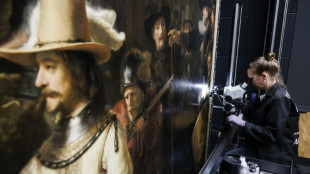 'Operation Night Watch': Rembrandt classic gets makeover
'Operation Night Watch': Rembrandt classic gets makeover
-
Haiti police, civilians kill 28 gang members: authorities

-
 Taxing the richest: what the G20 decided
Taxing the richest: what the G20 decided
-
'Minecraft' to come to life in UK and US under theme park deal


Saudi Arabia's growing cinema soft power
Accompanying Naomi Campbell on the red carpet at the Cannes Film Festival last week was one of cinema's most powerful men -- and he represents a country where cinemas were banned until five years ago.
Mohammed Al Turki, 36, heads Saudi Arabia's Red Sea Film Foundation, his name splashed all over posters and movie credits at the world's biggest cinema gathering on the French Riviera.
The foundation, formed two years ago, holds its own annual festival and has already financed 168 movies, including eight in the official selection at Cannes this year.
Among them was festival opener "Jeanne du Barry" about a French prostitute falling in love with King Louis XV, played by Johnny Depp.
Others seemed equally at odds with traditional Saudi values -- female-focused films such as "Four Daughters" about the religious radicalisation of Tunisian girls, or "Goodbye Julia" about a Sudanese woman and her overbearing conservative husband.
"We have learned to respect other cultures," Emad Iskandar, director of the Red Sea Film Foundation, told AFP.
He said the foundation focuses on Arab and African filmmakers, though the precise definition seems flexible: the French director of "Jeanne du Barry", Maiwenn, qualified thanks to her Algerian father.
"As long as we have the resources, we want to serve the region, but also take the opportunity to learn more," Iskandar added.
Al Turki's foundation also sponsored a gala for women, attended by Catherine Deneuve, Katie Holmes and supermodel Campbell.
"MO!! Proud of all your doing @redseafilm creating history of many 1st's and Changing the narrative," Campbell wrote of Al Turki on her Instagram.
- Whitewashing? -
Saudi largesse for the arts has boomed under the kingdom's de facto ruler, Crown Prince Mohammed bin Salman, with billions pouring into previously taboo areas such as music, fashion and sports.
Human Rights Watch says this is designed to "whitewash its dismal rights record" and that, despite recent reforms, Saudi Arabia continues to repress civil society, execute dissidents, discriminate against women and bury the investigation into the 2018 murder of journalist Jamal Khashoggi.
But most Saudis back the reforms, and its officials say it is absurd to expect the kingdom to turn into a liberal paradise overnight.
Accusations of whitewashing "sadden us more than anything else," said Iskander.
"Come to visit and get to know Saudi Arabia and then talk about us. The West has arrived where it is after years of wars and debates. We are a 90-year-old state -- be patient."
In any case, the relentless PR campaign is working. The Saudi presence at Cannes felt less controversial than that of Depp, still widely branded as toxic since his court battle with ex-wife Amber Heard.
Cannes director Thierry Fremaux celebrated the kingdom's interest in "producing films and allowing artists to emerge".
"Saudi Arabia is evolving," he told Variety.
- 'More and more present' -
All over Cannes were adverts calling on producers and directors to shoot in Saudi Arabia, while its pavilion showed off the work of its own young directors.
"Every year Saudi Arabia asks for a bigger pavilion, more facilities, to be more and more present," said Guillaume Esmiol, head of the Cannes Film Market that runs alongside the festival.
Saudi Arabia is not the only country in the region investing massively in cinema: rival Qatar financed 13 films at Cannes this year, including three in the main competition.
Some have little or no connection to the Middle East.
"We have a lot of French productions," Fatma Hassan Alremaihi, Doha Film Institute CEO, told AFP.
"We don't want to be insular, we want our filmmakers to be open to other regions and other filmmakers and work with them."
She had no qualms that such investments were aimed at spreading Qatar's soft power.
"Who doesn't do that? The US does that with their Hollywood films... At least we are doing what we believe in, and we are not losing our identity at the same time."
O.Gutierrez--AT

